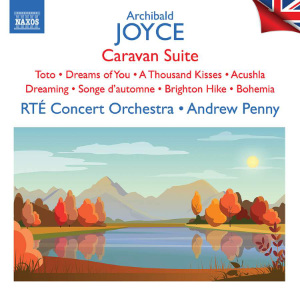
Archibald Joyce (1873-1963)
Orchestral Music
RTÉ Concert Orchestra/Andrew Penny
rec. 1994, Taney Parish Centre, Dublin
Naxos 8.555218 [67]
It comes as something of a surprise to see from his dates given on this disc that Archibald Joyce survived until the era of the Beatles and the Swinging Sixties. On the basis of the music included on this CD – which covers the whole of his compositional career – he might well have died fifty years earlier. There is little or no evidence of any acquaintance with pre-WW1 music hall or ragtime styles, and certainly none of any influence from the jazz era of the 1920s – in an unpleasant racialistically-tinged diatribe penned in the 1920s he describes the “maudlin” and “pent-up passions” of the jazz idiom as “animal.” At any rate Joyce clearly saw no reason whatsoever to concede to the passage of time any evolution of his style from that which had commercially established him during the Edwardian era as the “English waltz king,” who was regarded as a serious home-grown rival to Johann Strauss.
Indeed most of his reputation was founded on his output of waltzes and other dances for the ballroom, consisting formally of a brief introduction (never as elaborate as some of those by Strauss), an extended ternary-form dance with trio section, and a short-ish coda which sometimes combined elements of the earlier music with new material. In order to oblige the social requirements of the dance, the music was padded out with reams of repeats, and for the purposes of this recording many of the waltzes have been shorn of these in new editions prepared by Philip Lane. That is all to the good, since few of the items here could have been improved by greater extension and repetition of the basic material.
The two earliest of Joyce’s commercial successes (and the only two currently listed as available in alternative recordings), the waltzes Dreaming and Dream of autumn (originally published with the fashionably French title of Songe d’automne), are typical of his output. They demonstrate immediately his ability to forge a good strong melody, delicately orchestrated, and contrasted with a trio and section in another key (usually the dominant or subdominant) before the coda returns to bring the whole to a suitably glittering conclusion. Sometimes these were provided with lyrics to render them performable as songs, with poetry of often startling banality (which was sometimes the product of the composer himself); examples are given in the booklet, although thankfully not performed here.
Of a similar type here are A thousand kisses, Iris, Bohemia and Dreams of you. One of the most interesting of these waltzes, written as late as 1946 for university balls (with Oxford and Cambridge as usual lagging behind the times), is Song of the River, which despite a horrifyingly trite set of lyrics, displays a delightfully winsome introduction and coda – and also demonstrates that despite the passage of the years, the ability of Joyce to pen a memorable tune had not forsaken him. Acushlah, written as a tribute to the composer’s Irish wife, has a delightfully Celtic tinge. Other similarly characteristic ethnic twists are to be found in the semi-oriental Passing of Salome and Caravan Suite, the latter a collection of short pieces designed to be played during the many pseudo-Arabic silent movies that were so fashionable during the era. The Prince of Wales march trifles with the listener’s expectations by occasionally threatening to break into the well-known patriotic song God bless the Prince of Wales before launching instead into a not very memorable trio theme. To round out the selection of dances we are also given a series of brief excerpts from Toto, a “comedy with music” written in collaboration with Merlin Morgan; here we are given only the music composed by Joyce, in an arrangement by Philip Lane which again emphasises the links to the silent movies of the time.
Despite his innate conservatism and his conspicuous failure to move with the times, the reputation of Joyce as a composer of English light music is well served here in idiomatic performances by the RTÉ Concert Orchestra under Andrew Penny, recorded in a concert hall acoustic which serves the music rather better than the often cramped ballrooms for which it was originally composed. I cannot imagine many listeners will choose to listen to the disc uninterrupted from beginning to end; but at all events an attempt has been made to provide a suitably varied order for audiences, even when this departs sometimes from the strict chronological order of composition. And in the case of a composer like Joyce, whose music hardly evolved at all over the years, the latter is relatively unimportant.
The six pages of booklet notes by Philip Lane, preserved in full from the original full-price Marco Polo release, are comprehensive and exemplary (albeit in English only). I cannot imagine that Joyce will ever be better served on disc, and the reissue as Volume 13 of the Naxos series of British Light Music is therefore most welcome.
Paul Corfield Godfrey
Help us financially by purchasing from



Content (in order of composition):
Dream of Autumn (1908)
A Thousand Kisses (1910)
Dreaming (1911)
The Passing of Salome (1912)
Prince of Wales Grand March (1914)
Toto (1916): excerpts
Caravan Suite (1920)
Iris (1929)
Acushla (1932)
Bohemia (1941)
Dreams of You (1942)
Frou-Frou Polka (1946)
Brighton Hike (1946)
Song of the River (1946)


















